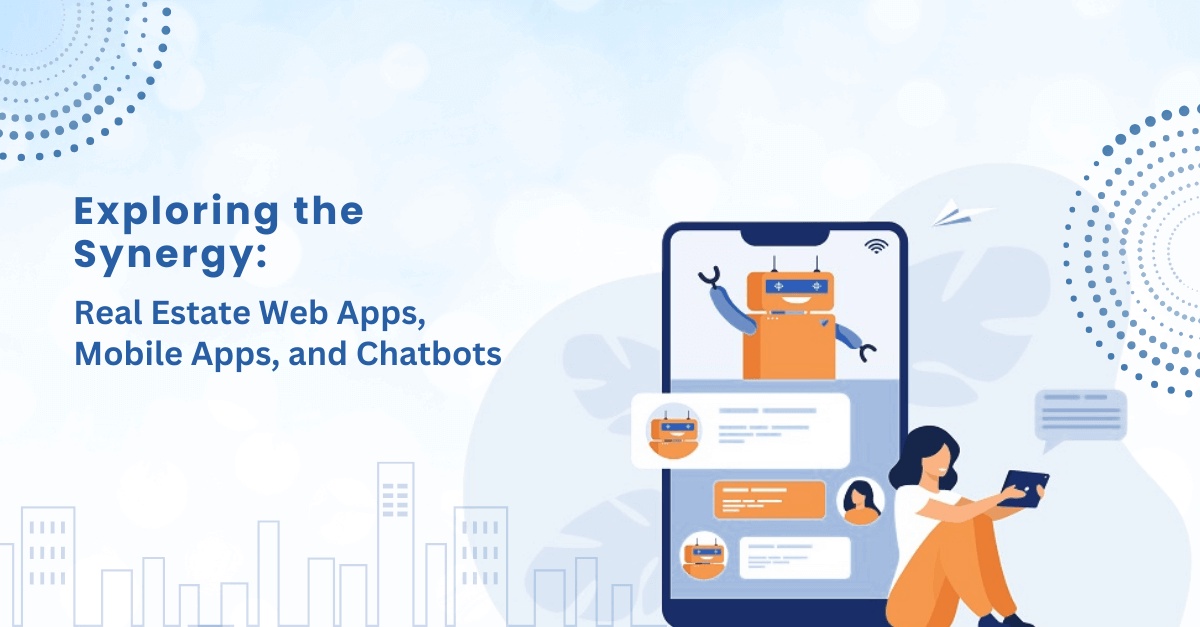The real estate market is no stranger to change. Gone are the days of dusty brochures and endless phone calls. In this data-driven era, a dynamic tech ecosystem has emerged, revolutionizing how we buy, sell, and manage properties. At the forefront of this revolution stand three critical players: real estate web apps, mobile apps, and chatbots. Though often deployed individually, their true power lies in their synergy. Picture a symphony, where each instrument shines, but the true magic unfolds when they harmonize. That's the potential of integrated web apps, mobile apps, and chatbots in real estate.
Introduction
- The Evolving Tech Landscape:
Today's real estate consumer is tech-savvy, demanding instant access to information, intuitive platforms, and personalized experiences. Web apps, mobile apps, and chatbots cater to these needs, offering:
- 24/7 access to property listings and market insights.
- Streamlined communication and lead generation.
- Personalized recommendations and virtual property tours.
- Automated tasks and seamless user experiences.
- The Importance of Integration:
But why stop at individual tools? Imagine a world where your web app seamlessly connects with your mobile app, and both are constantly in sync with your intelligent chatbot. This integrated ecosystem:
- Boosts user engagement and satisfaction.
- Enhances operational efficiency and data management.
- Provides actionable insights and fosters informed decision-making.
Real Estate Web Apps: Your Digital Home Base
- Role and Significance:
Web apps are your online headquarters, a comprehensive platform for:
- Showcasing property listings with vivid visuals and detailed descriptions.
- Implementing user-friendly search filters and sorting options.
- Enabling virtual tours and interactive property explorations.
- Integrating scheduling tools and online communication channels.
- Features and Functionalities:
Modern web apps go beyond static information, offering:
- Personalized dashboards with user-specific recommendations and saved searches.
- Market trend analysis and data visualization tools.
- Live chat integration for instant communication with agents or chatbots.
- Lead capture forms and CRM integration for efficient lead management.
- Case Studies/Examples:
- Zillow Premier Agent: Provides agents with a customizable web app for showcasing listings, managing interactions, and generating leads.
- Streetify: Offers interactive 3D virtual tours of properties, enhancing engagement and reducing the need for physical visits.
Mobile Apps in Real Estate
- Advantages of Mobile Apps:
Mobile apps are extensions of your web app, putting the power of real estate in your pocket:
- On-the-go property search and listing browsing.
- Real-time push notifications for new listings, price changes, and appointments.
- Geolocation features for local property discovery and neighborhood exploration.
- Personalized alerts based on user preferences and search history.
- Tailored Solutions for Property Management:
- Tenant portals for online payments, maintenance requests, and communication.
- Automated rent collection and lease management systems.
- Community features for building resident engagement and communication.
- Success Stories:
- Apartments.com: Their mobile app boasts over 100 million downloads, empowering users to find apartments across the U.S.
- Buildium: Offers a comprehensive property management app for landlords, streamlining rent collection, maintenance, and communication with tenants.
Chatbots Transforming Real Estate Interaction
- Enhancing Customer Engagement:
Chatbots are your tireless assistants, available 24/7 to:
- Answer FAQs and provide property details instantly.
- Qualify leads and schedule appointments, freeing up human agents for complex tasks.
- Offer personalized property recommendations based on user preferences.
- Engage in conversational marketing and nurture leads through the purchase journey.
- Streamlining Communication:
Chatbots eliminate the wait, offering:
- Live chat integration on web and mobile platforms.
- Multilingual support for broader reach and inclusivity.
- Automated follow-up messages and reminders to stay engaged with users.
- Showcasing Chatbot Applications:
- Compass uses chatbots to provide instant property information and schedule viewings.
- Real Geeks leverages chatbots to generate leads and qualify them before connecting them with agents.
Synergizing Web Apps, Mobile Apps, and Chatbots
- Collaborative Benefits:
When these technologies work together:
- Data seamlessly flows between platforms, ensuring consistent and personalized experiences.
- Chatbots can trigger actions on web and mobile apps, like scheduling appointments or initiating virtual tours based on user interactions.
- The user journey becomes smooth and efficient, moving seamlessly between devices and platforms.
- Seamless User Experiences:
Imagine:
- A potential buyer starts browsing properties on your web app.
- Their saved searches and preferences automatically sync to their mobile app for on-the-go exploration.
- A chatbot pops up on their phone offering personalized recommendations based on their browsing history.
- With a single click, they schedule a virtual tour directly from their mobile app, instantly connected to the agent through live chat on the web platform.
This level of integration creates a frictionless experience, fostering user engagement and boosting conversion rates.
- Future Possibilities:
The potential of this synergy is vast:
- AI-powered property valuation and market predictions for informed investment decisions.
- Voice-activated property searches and interactions for hands-free convenience.
- Hyper-personalized experiences with chatbots tailoring recommendations and offers to individual needs.
Innovations in Real Estate Tech
Beyond the core trio, other technologies are transforming the landscape:
- Augmented Reality (AR): Overlay property information and amenities onto live camera feeds, allowing users to virtually explore neighborhoods and visualize renovations.
- Big Data and Predictive Analytics: Gain valuable insights into market trends, tenant behavior, and potential risks to optimize investments and operations.
- Blockchain Technology: Enhance security and transparency in property transactions and ownership verification.
Challenges and Solutions
While the potential is vast, challenges exist:
- Data silos and compatibility issues: Integrating different technologies seamlessly requires careful planning and technical expertise.
- Security and privacy concerns: Protecting user data and maintaining transparency is crucial.
- Change management and user adoption: Encouraging stakeholders to embrace new technologies is essential.
To overcome these hurdles:
- Seek experienced technology partners: Choose specialists who understand real estate and can navigate integration complexities.
- Prioritize data security and privacy: Implement robust security measures and transparent data practices.
- Communicate effectively and provide training: Clearly explain the benefits of new technologies and train users on their effective use.
Conclusion: A Future Built on Synergy
The future of real estate is not just about bricks and mortar; it's about data, technology, and seamless user experiences. By embracing the synergy between web apps, mobile apps, and chatbots, real estate professionals can:
- Enhance customer engagement and satisfaction.
- Streamline operations and improve efficiency.
- Gain valuable data insights for informed decision-making.
- Stay ahead of the curve in a rapidly evolving market.
The time to act is now. Embrace the power of this integrated tech ecosystem and build a future where real estate thrives on collaboration, innovation, and a commitment to exceptional user experiences.


No comments yet